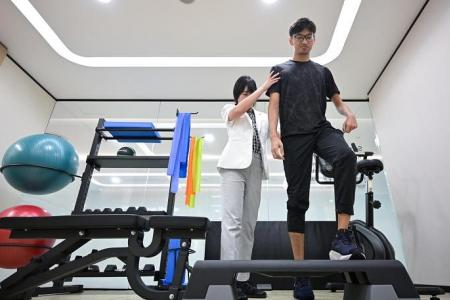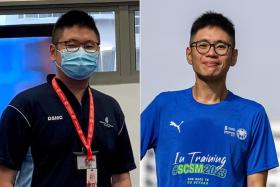Para-athletes get free healthcare services boost
While he was getting ready for the 200m race during the Asian Para Games in Hangzhou, China, in 2023, sprinter Lionel Toh collided with another athlete on the warm-up track.
The incident left the 24-year-old, who has cerebral palsy, with a fractured wristbone, for which he had to wear a brace for about eight weeks.
While such injuries are not uncommon among para-athletes, Mr Toh noted that getting the necessary treatment often requires going through the public healthcare system to get referrals to specialists – a long process that is not conducive for their training.
A new initiative aims to make it easier for para-athletes.
A two-year agreement between IHH Healthcare Singapore (IHH) and Para Athletics (Singapore) (PAS), signed in November 2023, will provide para-athletes at all levels here with complimentary healthcare services, as part of IHH’s Life Renewed corporate responsibility initiative.
IHH is Singapore’s largest private hospital operator, while PAS is a registered disability sport association that aims to provide para-athletes with opportunities to fully develop their athletic abilities.
The collaboration between IHH and PAS began after the latter expressed interest in obtaining subsidised medical services, said PAS vice-president Jaffa Mohamed Salleh.
“Mount Elizabeth Hospital, enthusiastic about supporting para-athletes, responded positively to the inquiry, leading to the partnership,” he added.
As part of the agreement, PAS athletes will have complimentary access to a wide range of healthcare services aimed at enhancing their fitness, recovery and competition readiness.
These include nutrition consultancy, physiotherapy and medical assessments, amounting to about $200,000 per year.
PAS and IHH will also collaborate on educational initiatives and other programmes for para-athletes.
The para-athletes will be able to arrange for consultation with IHH within a week’s notice – a process that could have taken months if done independently through other healthcare providers.
The partnership is a good fit as IHH has the medical resources and capabilities to help “under-served para-athletes and differently abled individuals”, said IHH Healthcare Singapore chief corporate officer Sherry Tan.
“Not all para-athletes receive support from government sports agencies. IHH believes all para-athletes can improve their fitness and performance if they have the right support and medical expertise,” she added.
Before the partnership, para-athletes in Singapore had faced challenges in getting medical services during routine training periods, said Mr Jaffa.
Sport Singapore would only provide such services to those who had won medals or showed the potential to do so, while developing para-athletes – including those with financial limitations – would have to pay for their medical services out of pocket, he said.
The collaboration with IHH aims to provide medical support to para-athletes at all levels, he said, adding there is limited government support for such athletes during the “crucial developmental stages”.
“We firmly believe that without adequate support at the grassroots level, para-athletes cannot ascend to the top,” Mr Jaffa said.
About 40 para-athletes actively participate in its training programme stand to benefit from the partnership.
Para-athletes from other para-sports groups will also be considered, based on their specific needs, he added.
Noting the collaboration is still in its early stages, the two organisations prefer to keep the numbers small for now, though this may change at a later stage, said Mr Jaffa.
Senior Parliamentary Secretary for Culture, Community and Youth Eric Chua, who attended the signing of the agreement in November 2023, described it as “a boost for our para-athletes in enhancing their healthcare and fitness experience, and competition readiness”.
Mr Toh, who works as a data officer, said the arrangement with IHH would help para-athletes – many of whom are not full-time sports people – get faster access to medical care.
“Some para-athletes go to school in the morning and then go for training in the evening when they’re tired, so there’s a higher chance for them to get injured,” he said.
Get The New Paper on your phone with the free TNP app. Download from the Apple App Store or Google Play Store now


